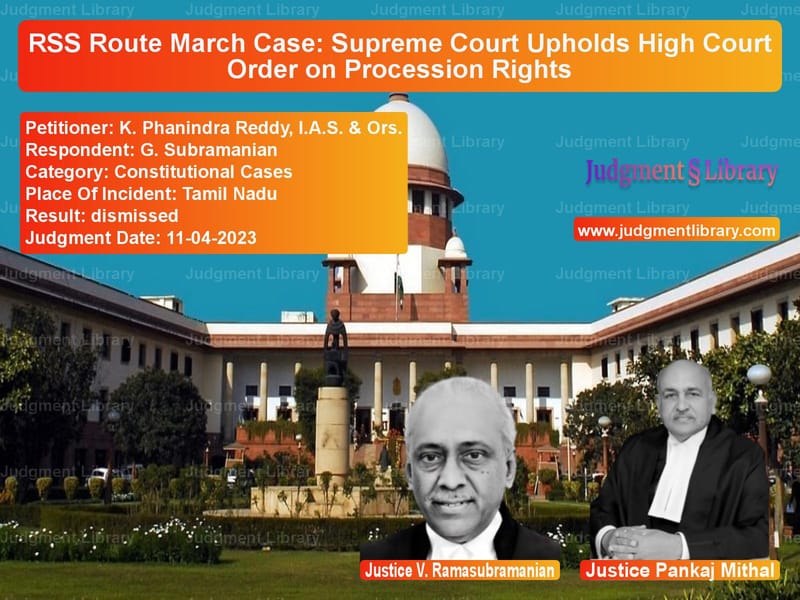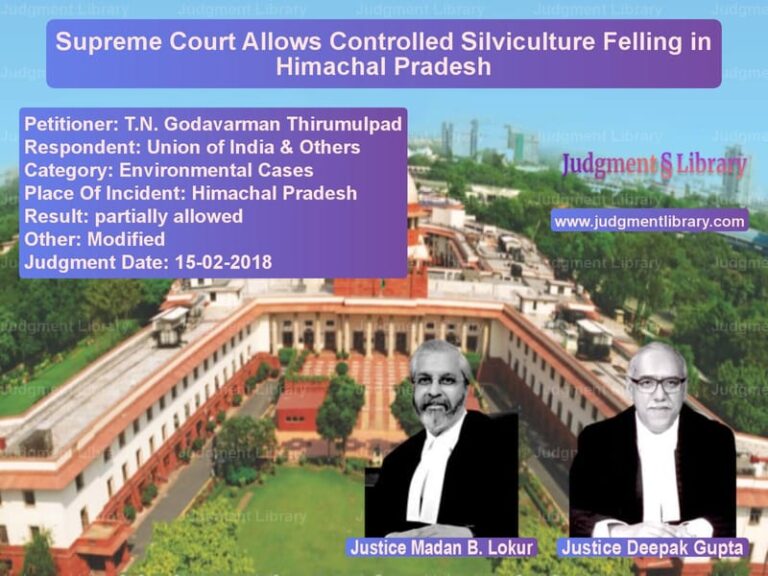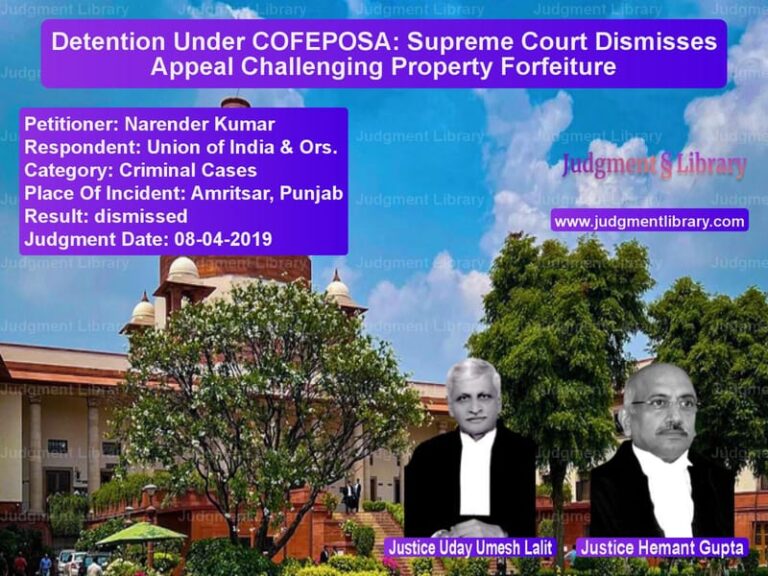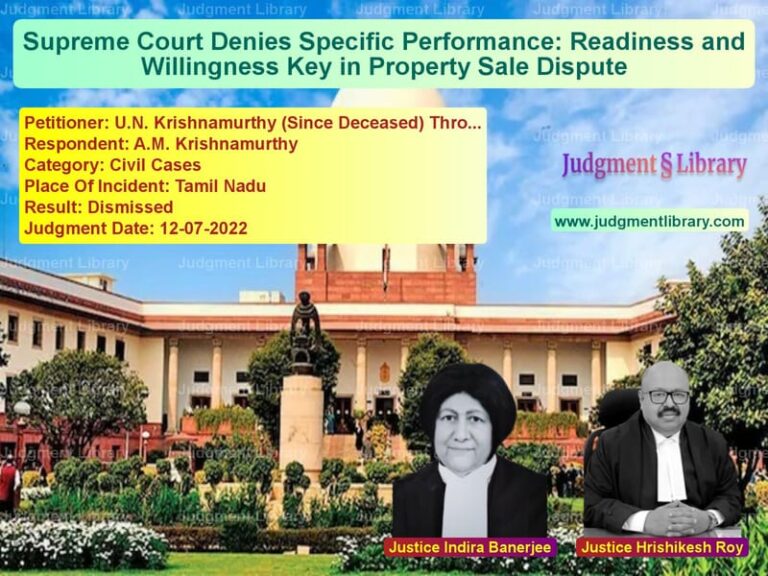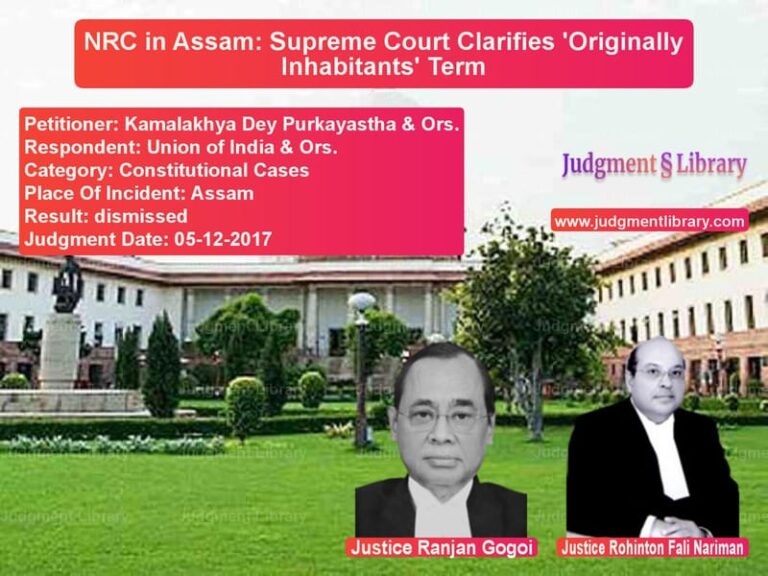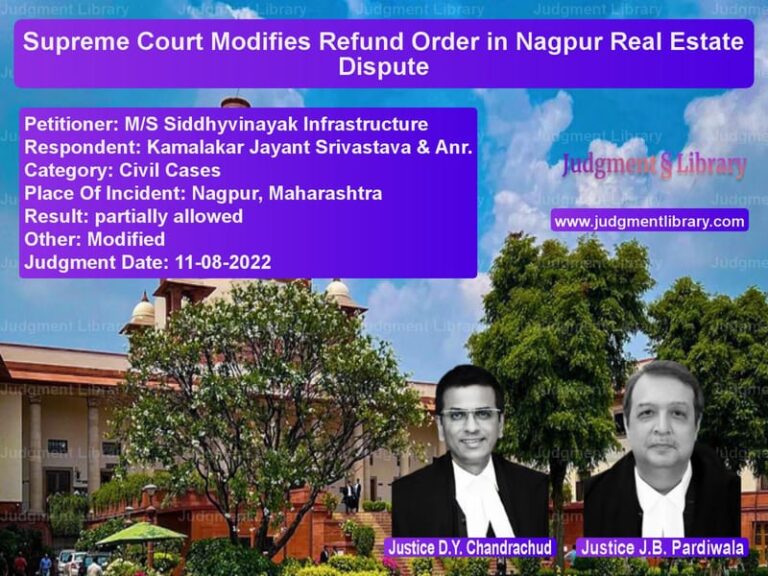RSS Route March Case: Supreme Court Upholds High Court Order on Procession Rights
The case of K. Phanindra Reddy, I.A.S. & Ors. v. G. Subramanian has significant implications for the right to peaceful assembly, the balance of public order, and the role of law enforcement in granting permissions for public demonstrations. The Supreme Court upheld the Madras High Court’s decision permitting the Rashtriya Swayamsevak Sangh (RSS) to hold its route march, dismissing the Tamil Nadu government’s objections.
Background of the Case
On 2 October 2022, members of the RSS sought permission to conduct a route march through various locations in Tamil Nadu. Their requests were denied by the authorities citing law and order concerns. The organizers approached the Madras High Court, which ruled in their favor on 22 September 2022, directing the state to grant permission with reasonable restrictions.
However, the Tamil Nadu government filed a review petition and subsequently refused permission for 24 locations, allowed indoor meetings for 23, and granted full permission in only three locations. The organizers filed contempt petitions against the authorities for non-compliance with the High Court’s order.
The High Court, in its final decision on 10 February 2023, reiterated that the RSS should be allowed to hold its procession as per the original order. The Tamil Nadu government then approached the Supreme Court.
Petitioner’s Arguments
Senior Counsel Mukul Rohatgi, representing the Tamil Nadu government, argued:
- After the Coimbatore cylinder blast on 23 October 2022, the law-and-order situation had changed, justifying restrictions on public gatherings.
- There was intelligence input suggesting potential clashes between RSS members and opposing groups.
- The decision to allow processions in some areas while restricting them in others was based on ground realities and aimed at maintaining peace.
- The High Court exceeded its jurisdiction by interfering with the state’s policing powers.
Respondent’s Arguments
Senior Counsels Mahesh Jethmalani, Guru Krishna Kumar, and Dr. Menaka Guruswamy, representing the RSS, countered:
- The state’s refusal to comply with the High Court’s order amounted to contempt of court.
- Public processions by the RSS have been lawful and were previously permitted in Tamil Nadu without incident.
- Intelligence inputs cannot be used to indefinitely deny fundamental rights like peaceful assembly.
- The state’s selective application of restrictions violated Article 14 (equality before the law).
Key Legal Issues
The Supreme Court examined the following:
- Can the government override a judicial directive allowing a peaceful assembly?
- Did the state provide sufficient evidence to justify restrictions under law-and-order concerns?
- Was the refusal to allow processions in some areas arbitrary?
Supreme Court’s Observations
The Supreme Court ruled against the Tamil Nadu government, stating:
- “The state cannot refuse permission merely based on intelligence reports without specific evidence of threats.”
- “Once a judicial order has been passed, the state must comply or seek modification through proper channels.”
- “The organizers had agreed to conduct the march peacefully and with necessary security measures.”
- “The state’s actions amounted to arbitrary denial of fundamental rights.”
The Court further held that concerns about security could be addressed by increased police deployment but could not serve as a justification for blanket restrictions.
Final Judgment
The Supreme Court dismissed the Tamil Nadu government’s appeal, stating:
“The special leave petitions are accordingly dismissed. No costs. Pending applications, if any, shall stand disposed of.”
Impact and Legal Significance
- Reaffirms the right to peaceful assembly: Authorities cannot deny permissions based on vague law-and-order concerns.
- Limits executive overreach: Ensures that state governments comply with judicial directives.
- Clarifies policing powers: Law enforcement must balance security concerns without violating fundamental rights.
Conclusion
The ruling in K. Phanindra Reddy, I.A.S. & Ors. v. G. Subramanian reinforces the judiciary’s role in protecting civil liberties against executive overreach. The decision affirms that processions cannot be prohibited solely based on speculative threats and that law enforcement must facilitate peaceful assemblies while maintaining public order.
Petitioner Name: K. Phanindra Reddy, I.A.S. & Ors..Respondent Name: G. Subramanian.Judgment By: Justice V. Ramasubramanian, Justice Pankaj Mithal.Place Of Incident: Tamil Nadu.Judgment Date: 11-04-2023.
Don’t miss out on the full details! Download the complete judgment in PDF format below and gain valuable insights instantly!
Download Judgment: k.-phanindra-reddy,-vs-g.-subramanian-supreme-court-of-india-judgment-dated-11-04-2023.pdf
Directly Download Judgment: Directly download this Judgment
See all petitions in Fundamental Rights
See all petitions in Public Interest Litigation
See all petitions in Separation of Powers
See all petitions in Judgment by V. Ramasubramanian
See all petitions in Judgment by Pankaj Mithal
See all petitions in dismissed
See all petitions in supreme court of India judgments April 2023
See all petitions in 2023 judgments
See all posts in Constitutional Cases Category
See all allowed petitions in Constitutional Cases Category
See all Dismissed petitions in Constitutional Cases Category
See all partially allowed petitions in Constitutional Cases Category

